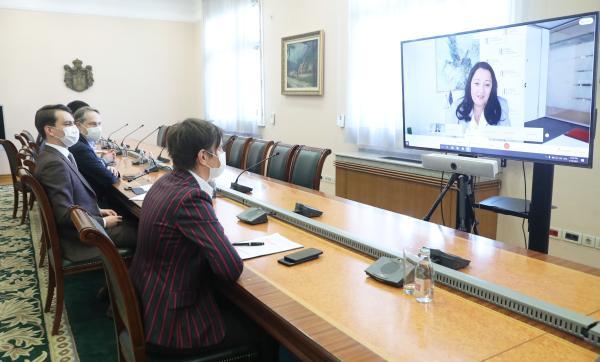
- The EIB confirms its commitment to invest in infrastructure and the private sector in Serbia
- The EIB will support Serbia in addressing the negative effects of the COVID-19 pandemic and boosting its green and digital transformation in line with the new Economic and Investment Plan
- In 2021, transport connectivity remains a top priority for the EIB in Serbia alongside support for the private sector, particularly SMEs, the social economy and impact finance
EIB Vice-President Lilyana Pavlova, responsible for operations in the Western Balkans, met with Serbian Prime Minister Ana Brnabić today in an online meeting to discuss the European Investment Bank’s (EIB’s) investment plans for Serbia. The EIB reaffirmed its commitment to help the region in its COVID-19 recovery and to support private sector development and the region’s transformation into a greener and more digitalised economy.
The EIB expressed its support for rolling out the Economic and Investment Plan in Serbia for investments in green and digital projects and the creation of a common regional market. The EIB will continue investing in small and medium-sized enterprises (SMEs), key transport and wastewater management infrastructure, and the improvement of healthcare and education facilities across the country.
In the last 10 years alone, the EIB has invested over €8 billion in the region for the modernisation of vital infrastructure and private sector development. Digitalisation will continue to be a key EIB priority as it improves the economy’s competitiveness and enables public bodies to help build resilience during emergencies more effectively. For the digital transformation, the EIB unlocked €65 million in 2020 for introducing IT equipment and high-speed internet in Serbian schools*. The EIB will also encourage the transition to a cleaner, more diverse renewable energy supply in the region by developing new energy efficiency projects.
Vice-President Lilyana Pavlova, responsible for the EIB’s activities in Serbia, said: “The COVID-19 crisis posed unprecedented challenges that require a longer-term transformation into a greener and more digitalised, innovative and resilient economy. As a long-standing partner for Serbia and the region, the EIB will continue providing financial and technical assistance in facilitating this transition that will bring about competitiveness, productivity and growth, as well as integration with the regional market. With this, Serbia will take its rightful place within the EU value chains and attract investments that will generate new employment opportunities, innovation and economic prosperity.”
The Prime Minister of the Republic of Serbia Ana Brnabić stated: “Successful cooperation of Serbia and the EIB on the previous projects has particularly showed its results during the pandemics. It has been evident mostly in the healthcare sector and preparedness of the hospitals and medical conditions in the Republic of Serbia, to respond to this pandemic. In addition, we would like to express our great gratitude to EIB for investing in Science-technology centres in Serbia that support us in building innovation-based economy, and for all other projects such as Connected schools, which have significantly contributed to our good economic results in 2020.”
Following the EIB’s €1.7 billion financial package adopted in May to help Western Balkan countries mitigate the negative effects of the COVID-19 crisis, the EU bank already mobilised over €1 billion for the region in 2020. The funds are allocated to supporting local economies, healthcare and other infrastructure sectors to address the most urgent deficits and help build long-term resilience to emergencies. Significant funds were provided to SMEs to help maintain liquidity, business continuity and employment.
For inclusive finance, the EIB signed its first ever innovative Impact Incentive Loan** in 2020, aiming to encourage Serbian companies to provide long-term employment to people from vulnerable groups. In 2020, a total of €175 million was invested in Serbian SMEs by the EIB Group, which will help local banks offer credit lines to small businesses under more affordable terms.Background information
About the EIB in Serbia:
The EIB has been active in the territory of Serbia since 1977, providing finance to support key infrastructure projects, industry, services and local authorities as well as small and medium-sized enterprises (SMEs). To date, the EIB has provided over €6 billion of financing to SMEs and transport, education, healthcare and utility infrastructure projects.
About the EIB in the Balkans:
The EIB is one of the leading international financiers in the Western Balkans.
About EIB Climate Action:
The European Investment Bank is active in around 160 countries and is the world’s largest multilateral lender for climate action projects. The EIB Group has recently adopted its Climate Bank Roadmap to deliver on its ambitious agenda to support €1 trillion of climate action and environmental sustainability investments in the decade to 2030 and to deliver more than 50% of EIB finance for climate action and environmental sustainability by 2025. Also, as part of the Roadmap, from the start of 2021, all new EIB Group operations will be aligned with the goals and principles of the Paris Agreement.